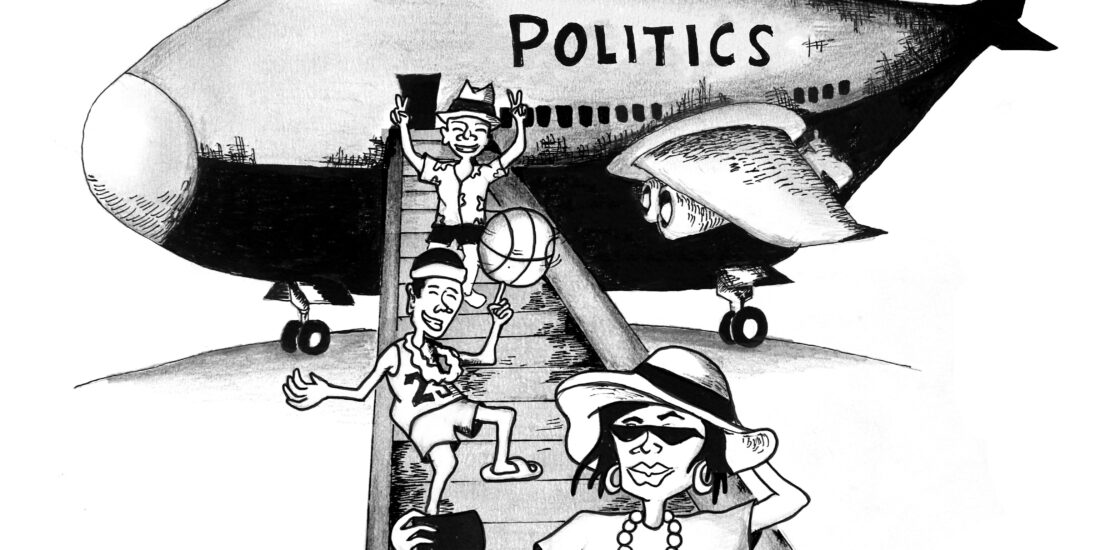Tañada tackles Charter Change and Federalism
Raising the level of discourse amid the ongoing debate on the proposed shifting of the government system to federalism, the Political Science Program Council (PSPC), together with the College of Liberal Arts and Communication Student Council, held a lecture forum on Charter Change and Tax Reform for Acceleration and Inclusion (TRAIN) Law titled Lectures on Issues Vital for Empowerment (LIVE) to educate the DLSU-D community on that impact of its advantages and disadvantages.

National discourse
Since his campaign period, President Rodrigo Duterte has been voicing his plan to shift the government system to adopt federalism, with hopes of expanding the reach of development to the provinces. As Duterte nears the end of his second year in office, the president appointed 19 members to a Consultative Committee (Con-Com), chaired by former Chief Justice Reynato Puno, with the purpose to “study, conduct consultations, and review the provisions of the 1987 Constitution, including but not limited to the provisions on the structure and powers of the government, local governance, and economic policies,” as per Puno.
The Con-Com’s proposals shall be deliberated in Congress through a Constitutional Convention (Con-Con) or a Constituent Assembly (Con-Ass), to propose the amendments or revisions to the 1987 Philippine Constitution, or Charter Change (Cha-Cha), which is to be approved by the voting public through a plebiscite.
Con-Con and Con-Ass are two of the three methods to propose revision or amendments to the Constitution, with the other being the People’s Initiative (See: Section 2 of Article 17 of the 1987 Philippine Constitution). As provided for in the said article, the Congress, with a vote of two-thirds or majority from its members, can initiate a Con-Con which will be made up of elected members to propose amendments and revisions. Meanwhile, the Con-Ass is convened through the three-fourth vote of all the members of the Congress.
Currently, the Congress majority bloc is composed of PDP-Laban members, Duterte’s party affiliate, who are knowingly supportive of his push for federalism.
Federalism may be initiated if the Charter Change is approved and the new constitution is drafted. This type of government aims to remove the centralized power on the government in order to divide it among the proposed different states of the country.

Charter Change
Offering insight to the pressing issue to change the political and governmental structure of the Philippines, former Deputy Speaker in the House of Representatives Lorenzo Tañada III discussed the reasons behind the President’s push for Charter Change.
“Anong sinasabi ni Pangulong Duterte kung bakit kailangan palitan ang saligang batas? Imperial Manila raw ang may kasalanan … Can you find [Imperial Manila] in the Constitution? May kasalanan ba ang Constitution? Wala,” he said.
“Imperial Manila” is also generally known as the centralization of everything from resources to culture around the country’s capital, often deprioritizing the needs of the provinces. In relation to this, Tañada explained how it is the national government that is responsible for the distribution of resources which are collected from the local government units, citing Quezon City Mayor Herbert Bautista’s comments on the topic.
Moreover, Tañada noted the relation between “Imperial Manila” and change of dynamics whenever the Commission on Election proclaims a new president, in which almost all local government units will change alliances to the prevailing party as the distributed resources are dependent upon the incumbent president.
Not known by many, he furthered that the current 1987 Constitution has a Local Government Code of 1991, similar to the federalism type of government, which has not been fully utilized to its potential, especially since no assessments have made to review if the Local Government Code has been effective in all the regions of the Philippines, as per Tañada.
Noting that there is no need for Charter Change, but only certain amendments to the Local Government Code of 1991, Tañada posed the question, “Can we amend the local government code that states that whatever resources the local government unit is supposed to reach, it should be maintained at the local government and not brought to the national government?”
He furthered that the 1987 Constitution recognizes the importance of the local autonomy, as it is formed mainly for the participation of the people to prevent another dictatorship from taking place.
Furthermore, Tañada tackled how certain provisions in the proposed constitutional change are somewhat questionable, particularly the provision giving foreigners the right to own residential, agricultural, commercial and mineral lands, “Bakit ibibigay sa mga dayuhan, ‘diba dapat sa atin muna?” Tañada expressed.

TRAIN Law
On the issue of the Tax Reform Acceleration and Inclusion (TRAIN) Law, Tañada also discussed the implications of the TRAIN Law, particularly on its effect on the marginalized sectors of the country.
“Not all Filipinos are paying income tax, yung mga mahihirap, yung mga magsasaka, yung mga tricycle driver, jeepney driver, yung mga mangingisda, nagbabayad ba sila ng income tax? Ano yung pakinabang nila sa income tax? Wala,” Tañada said.
Moreover, Tañada discussed the platform of the President during the elections on minimizing the income taxes.
“Ano ba yung pangako ng pangulo during the campaign? ‘I will minimize income taxes’, he complied with his promise, but he did not state that he will raise taxes also, so anuman yung napakinabangan natin sa pagbaba ng income tax, nakain na,” he said.
Tañada advised DLSU-D students and faculty present during the forum to practice critical thinking, study the structure of the proposed Charter Change, and give heed to certain provisions that may raise questions.





